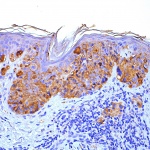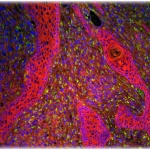
News • Melanoma therapy
Why pregnancy could literally save your skin
Researchers in the Perelman School of Medicine at the University of Pennsylvania have identified a new therapeutic target for the treatment of melanoma. For decades, research has associated female sex and a history of previous pregnancy with better outcomes after a melanoma diagnosis. Now, a research team from Perelman School of Medicine at the University of Pennsylvania says it may have…























